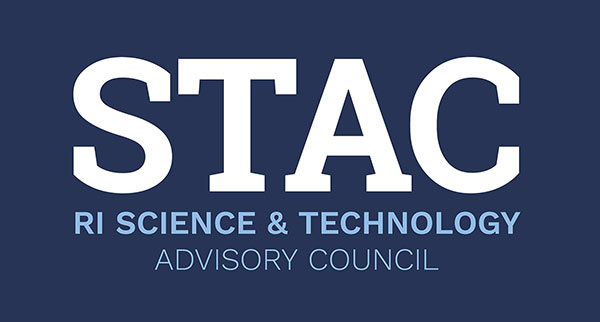2019 STAC Collaborative Research Grant Awardees
Five interdisciplinary research teams were selected to receive funding, totaling $381,069, from the Science & Technology Advisory Council (STAC) this year. Research projects directly address the RI NSF EPSCoR proposed program themes of:
- Assessing Resilience: What are the key data, methods, and/or techniques needed to assess the current health of Narragansett Bay and its resilience to anthropogenic stressors in real time?
- Understanding complexity: How can our understanding and data collections of the physical, biogeochemical and ecological processes that contribute to coastal ecosystem complexity be used to improve and evaluate Narragansett Bay ecosystem models?
- New Innovations: What new innovations in sensors are needed to improve the collection of data on the physical, biogeochemical, and ecological processes as well as anthropogenic stressors (e.g., pollution) that are impacting Narragansett Bay?
- Increasing Engagement: How can novel approaches to the visualization of complex information, coastal species and environmental change, fostered through the collaboration of artists, designers, engineers and scientists, promote broader engagement in and understanding of scientific research, data, and findings?
- Improving Sustainability: How does the coastal environment affect humans and how can human behavior and responses be modified to improve coastal ecological and economic sustainability?
- What new tools or techniques are needed to capture, analyze, and disseminate large data sets that engage and inform academic, industry, government and community stakeholders?
Recipients
Engineering Reliable and Affordable Tools for Environmentally- and Economically- Driven Aquatic Monitoring ($80,000)
This project seeks to design an integrated water sampling and chemical analysis device for profiling the commercially and environmentally important polysaccharide component of dissolved organic matter. Once designed, the new device will dramatically simplify sample processing and improve analysis reliability and performance by enabling real time monitoring
- Rebecca Robinson, University of Rhode Island
- Jason Dwyer, University of Rhode Island
- Amit Basu, Brown University
- Bernard Munge, Salve Regina University
Coupling physical and ecological models to understand how climate drives disease outbreaks in Narragansett Bay ($80,000)
This collaborative project combines expertise in ocean modeling, aquatic pathology, ecological interactions in plankton, aquatic diagnostics and epidemiological modeling to quantify the processes that shape the longevity of the oyster parasite Perkinsus marinus outside its host environment. As part of the project, the team would test ocean circulation models that predict the spread of the parasite in coastal waters. The modeling framework would catalyze future research predicting how climate variability and human activities impact coastal ecological and economic sustainability.
- Marta Gomez-Chiarri, University of Rhode Island
- Tal Ben-Horn, University of Rhode Island
- Susanne Menden-Deuer, University of Rhode Island
- Baylor Fox-Kemper, Brown University
- Roxanna Smolowitz, Roger Williams University
- Eric Schneider, RI Department of Environmental Management
Quantifying wet and dry deposition of ammonium to Narragansett Bay ($79,739)
This project will contribute new data and new methods to quantify AD of ammonia/um, likely an important anthropogenic stressor, which can be used to improve understanding on non-point source nutrient loading to the coastal ecosystem for more accurate modeling of biogeochemical and ecological processes. Data derived can also be used to inform non-point source management decisions, ultimately improving the health and resilience of the Bay. This work will contribute first-of-its-kind applications for quantification of air-sea fluxes of ammonia/um and the purchase of equipment that can be used for future studies in coastal and urban areas of Rhode Island.
- Meredith Hastings, Brown University
- Brian Heikes, University of Rhode Island
Building essential bridges between ecosystem data and hydrodynamic-ecosystem models of Rhode Island Coastal Waters through CHN analysis ($61,330)
This project seeks to extend knowledge of Narragansett Bay zooplankton populations and their relationships with other aspects of the marine ecosystem. Advances expected include development of a comprehensive table that will relate zooplankton biomass, nitrogen concentration and carbon concentration, overlapping temporal-spatial zooplankton records from the pump station, in-situ net tows and ADCP backscatter proxy and more accurate coupled ROMS-Fennel ecosystem models that incorporate new zooplankton observations and observational capacity in process-simulation of key processes.
- Chris Kincaid, University of Rhode Island
- Barbara Sullivan-Watts, Providence College
Testing nanographene as passive samplers for emerging contaminants of concerns in Narragansett Bay ($80,000)
The overall goal of this project is to bring together expertise in environmental chemistry and nanomaterials to first formulate novel advanced graphene nanomaterials then and to field test a passive sampler for emerging contaminants in the water of Narragansett Bay. This project will lead to the development of novel tools for the detection and remediation of contaminated sites.
- Rainer Lohmann, University of Rhode Island
- Robert Hurt, Brown University
